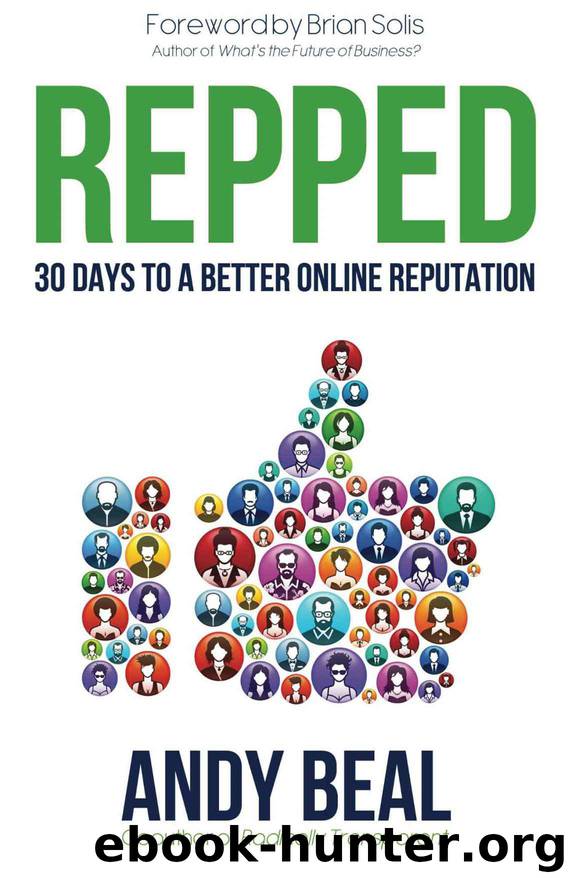Repped: 30 Days to a Better Online Reputation by Andy Beal

Author:Andy Beal
Language: eng
Format: mobi
Published: 2014-01-19T18:30:00+00:00
DAY 16
Don’t Talk Trash
“Never make negative comments or spread rumors about anyone. It depreciates their reputation and yours.” —Brian Koslow
THERE’S A REASON why online reputation management has become so important. The rise of social media has made it easy for anyone to take to the web and share their opinion about anyone or anything. Sometimes those opinions are a deliberate attack and sometimes it’s just a simple case of wanting to vent. Let off a little steam.
The problem for you is that it can be tempting to do just that when dealing with a difficult customer or annoying competitor. An off-the-cuff tweet about a customer, a Facebook post about your boss, or blog comment about one of your competitors might seem benign, but can quickly escalate into a reputation crisis you didn’t see coming.
Don’t trash-talk
The problem with talking smack is that your attempt to devalue the reputation of someone else often backfires against you. Unless you’re an NFL quarterback or WWE wrestler, talking trash makes you look petty, desperate, or just plain ugly. It doesn’t even matter if you trash-talk in a private forum or behind a protected Twitter stream, this stuff tends to leak out. There you were carefully crafting the perfect brand and now your own words have tarnished your reputation.
In the movie Bambi, the character Thumper is reminded, “If you can't say something nice, don't say nothin' at all.” Great advice that’s worth exploring in more detail.
Don’t talk trash about your competitors
As you grow your reputation, you’ll find yourself on the radar of more and more stakeholders. These people will undoubtedly have questions about why they should trust, and do business, with you. Inevitably, you’ll be asked how you stack up to your competition. Be careful, it’s a trap!
While you should know how you match up to your biggest competitors, you should also know how best to relay that information without it appearing as though you are trash talking. The key is to play to your own strengths in such a way that it highlights your competitors’ weaknesses.
If you’re comparing yourself to your competition in general, then you’ll want to pick two or three talking points where you know that your reputation is the strongest. If you’re asked to compare yourself to a specific competitor, then you can be more specific in the areas that you wish to highlight. Saying, “We offer the best battery life of all tablet manufacturers,” sounds a whole lot better than, “Have you seen how awful the battery life is for Competitor X’s tablet?”
If nothing else, talking trash about your competitors is a distraction. First, you allow yourself to be compared to another person or company. Don’t let their brand become a part of your reputation positioning. Second, how far are you willing to go with this? What if your competitor starts talking negatively about your brand? What if they get so annoyed with your comparisons that they start running display ads attacking your brand? Not only can trash talk become a drain on your time, but it can also drain you financially.
Download
This site does not store any files on its server. We only index and link to content provided by other sites. Please contact the content providers to delete copyright contents if any and email us, we'll remove relevant links or contents immediately.
Influence: The Psychology of Persuasion by Robert B. Cialdini(4750)
The Miracle Morning by Hal Elrod(4692)
The Hacking of the American Mind by Robert H. Lustig(4355)
Pre-Suasion: A Revolutionary Way to Influence and Persuade by Robert Cialdini(4193)
Unlabel: Selling You Without Selling Out by Marc Ecko(3639)
Ogilvy on Advertising by David Ogilvy(3580)
Hidden Persuasion: 33 psychological influence techniques in advertising by Marc Andrews & Matthijs van Leeuwen & Rick van Baaren(3536)
Purple Cow by Seth Godin(3178)
Who Can You Trust? by Rachel Botsman(3118)
Kick Ass in College: Highest Rated "How to Study in College" Book | 77 Ninja Study Skills Tips and Career Strategies | Motivational for College Students: A Guerrilla Guide to College Success by Fox Gunnar(3106)
The Marketing Plan Handbook: Develop Big-Picture Marketing Plans for Pennies on the Dollar by Robert W. Bly(3026)
This Is Marketing by Seth Godin(3004)
I Live in the Future & Here's How It Works by Nick Bilton(2975)
The Power of Broke by Daymond John(2953)
The Tipping Point by Malcolm Gladwell(2896)
Building a StoryBrand by Donald Miller(2879)
The 46 Rules of Genius: An Innovator's Guide to Creativity (Voices That Matter) by Marty Neumeier(2828)
Draw to Win: A Crash Course on How to Lead, Sell, and Innovate With Your Visual Mind by Dan Roam(2765)
Market Wizards by Jack D. Schwager(2685)
